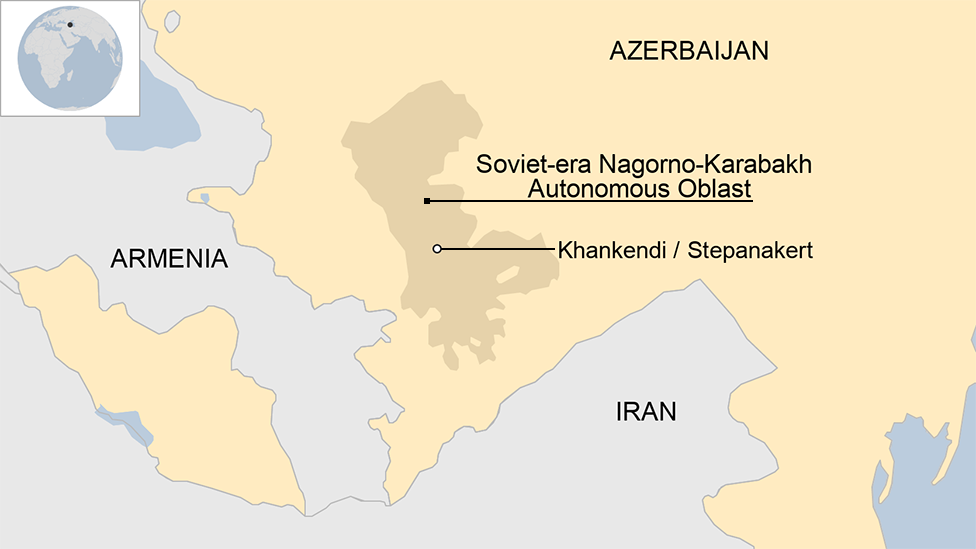Armenia in global publicity drive
- Published
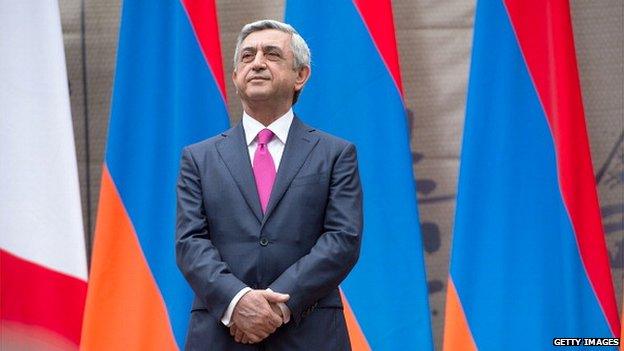
President Serzh Sargsyan wants to raise Armenia's profile
Where in the world is Armenia? It's a question that the country's President, Serzh Sargsyan, is hoping to get more people around the globe to answer correctly.
He wants to mobilise the 10 million Armenians living abroad for a global internet publicity campaign to boost tourism and influence foreign investors.
Entitled the One Armenian, One Article campaign the idea is to get expatriates to write positive stories about the country.
President Sargsyan and others behind the publicity drive say their country needs a higher profile, because many people struggle to recall anything about the nation.
So just what do people know about Armenia?
'We never hear about it'
London in the summer is full of tourists so it was easy to conduct an impromptu series of informal interviews, ambushing dozens of unsuspecting strangers from around the globe to get their views.
A couple from Saudi Arabia had heard of Armenia but only knew it was in Asia, while a Danish woman told me that "we never hear about it in Denmark."
But the most amusing was a man with his family from the United States, who could only tell me that "all the people's names end in '-ian'."
His wife was quick to tell me he based that on the celebrity Kim Kardashian.

The socialite Kim Kardashian is one of many who have family roots in Armenia
Only one of the people I spoke to knew much about Armenia, and that was a woman from Paris who had been to the capital, Yerevan, and said, "It is a small country and its people have suffered a lot."
My questioning was strictly informal, but it does suggest the size of the challenge facing President Sargsyan and his compatriots.
'Soft power'
Enlisting people around the world who have Armenian roots to raise the country's profile could prove effective. Famous people with connections to Armenia include the singer Cher, tennis player Andre Agassi, billionaire investor Kirk Kerkorian and the late Steve Jobs of Apple.
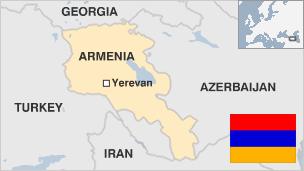
"The Armenian diaspora sees itself in many ways as the second army of the Republic of Armenia," says Aram Suren Hamparian, executive director of the Armenian National Committee of America, based in Washington DC.
"Armenians spread around the world and prospered wherever they went, and they haven't forgotten their roots and they try to stay connected - and that is part of the soft power of the Armenian nation."
Armenia's ancient culture survived decades of Soviet influence before independence in 1991. But despite its independence, the country still has significant economic ties to Russia.
Next year, the government in Yerevan plans to join the common economic zone of the Russian Federation, alongside Kazakhstan and Belarus.
Armenia relies heavily on loans from Moscow as well as the World Bank, the International Monetary Fund and the Asian Development Bank.

Armenia: Key facts
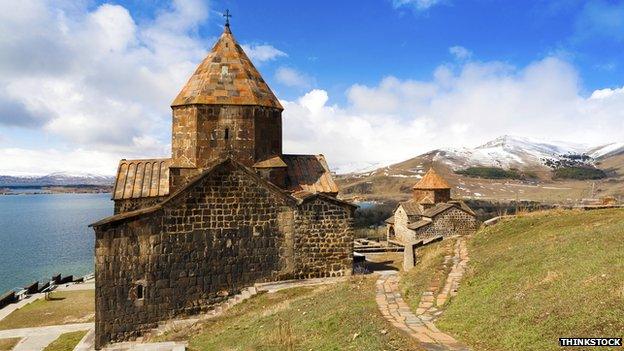
Size of economy: $10.4bn (£6.3bn)
Economic growth: 3.5%
Population: 2.9 million
Proportion of population below poverty line: 32.4%
Life expectancy: 74 years
Sources: World Bank and CIA World Factbook, 2013

Closed borders
Money sent home by expatriate workers is also a major driver of economic activity, and accounts for one-fifth of Armenia's economy.
"Remittances from Armenian workers living abroad are very important, it provides resources, US dollars, to fund imports in Armenia and to fund consumption," says Teresa Daban Sanchez, the IMF's resident representative in Yerevan.
Yet "90% of remittances come from Russia," she adds - underlining the country's trade links with Russia.
However, Armenia's economic development is hindered because its borders with Azerbaijan and Turkey are closed.
Being blocked from trading with Turkey, one of the region's biggest economies, is a big barrier to growth.
Reopening the borders would transform Armenia's economy, says Ms Daban Sanchez.
"Opening them, especially the border with Turkey, will really be a game changer, because Turkey's a large diversified economy with access to European markets."
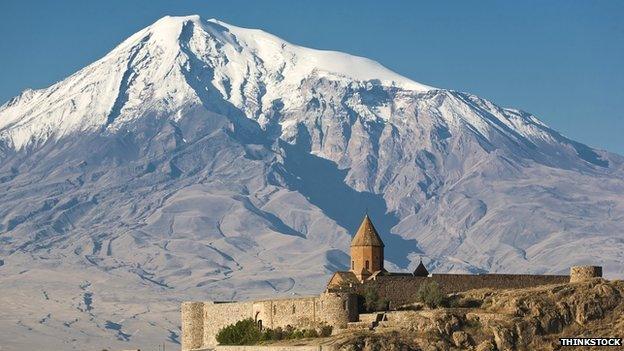
Being landlocked presents a "huge challenge", says the IMF's Teresa Daban Sanchez
The reasons the borders are shut lie in two 20th Century conflicts.
During World War One, between 1915 and 1917, hundreds of thousands of ethnic Armenians died at the hands of Ottoman Turks.
Yerevan wants Turkey to recognise the deaths as genocide and some countries have done so, but Ankara insists there was no genocide and that the dead were victims of the war.
It remains a highly sensitive issue.
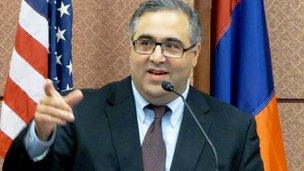
Expatriate Armenians provide significant "soft power", says Aram Suren Hamparian
Meanwhile, a fragile ceasefire is in place with Azerbaijan on Armenia's eastern border, over the disputed Nagorno-Karabakh region.
In 1988, towards the end of Soviet rule, Azerbaijani troops and Armenian secessionists began a war that left the region in the hands of ethnic Armenians when a truce was signed in 1994.
Negotiations have so far failed to produce a permanent peace agreement, and the dispute remains as a so-called frozen conflict.
Tourism potential
Yet even if Yerevan and its neighbours do reopen their borders, the IMF's Teresa Daban Sanchez cautions that the country still faces the more basic challenge of its location.
"Armenia, remember is a landlocked country, so even without these geopolitical problems Armenia has a huge challenge."
If Armenia's expatriate community can effectively be mobilised for an online public relations offensive then the country could attract more visitors and perhaps more business for travel agents.
"People will get an idea of what it's like," says Gillian Leaning, marketing manager at the UK travel company Regent Holidays.
"They'll see images of the ancient monasteries and they'll hear about the rolling valleys of the Lesser Caucasus, or what it's like to taste the country's brandy in Yerevan.
"So they'll be far more likely to choose it as a destination for their next holiday."
In addition to boosting tourism, positive stories online could also catch the attention of possible foreign investors and to quote an old Armenian proverb: "Whatever the eye sees, the heart won't forget."
Listen to more from Russell Padmore on Armenia's publicity drive, external on BBC World Service's World Business Report.
- Published30 January 2024
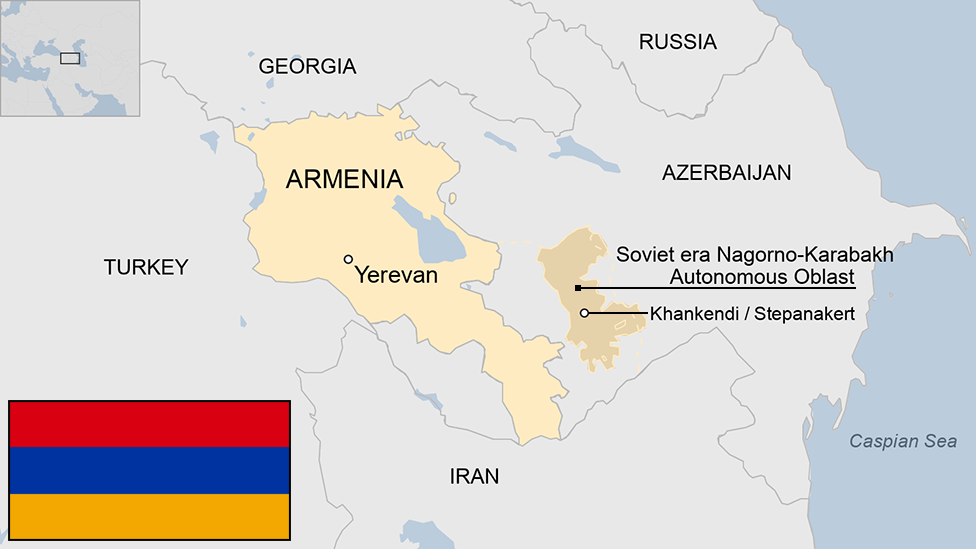
- Published8 August 2014
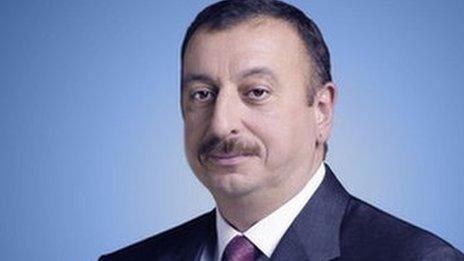
- Published2 August 2014
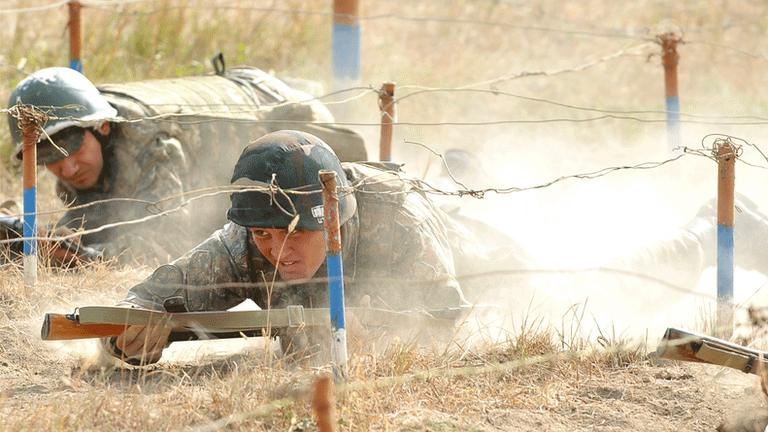
- Published30 January 2024
